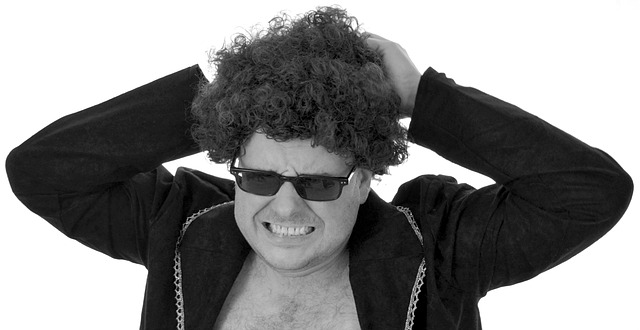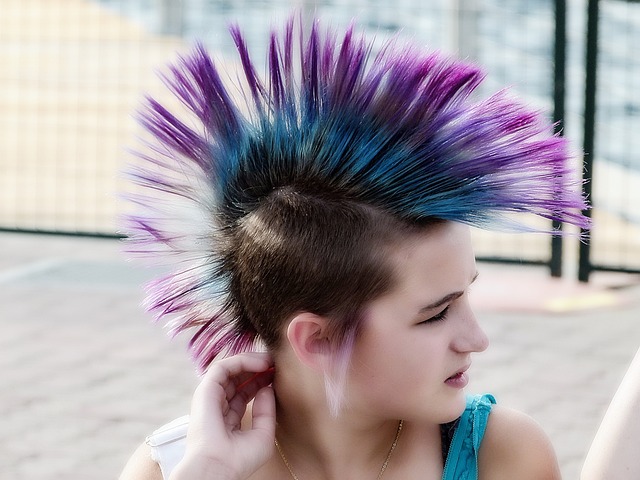13 essential Spanish expressions to do with hair

Has someone ever told you that they're taking your hair or that you don't have one hair of a fool? Here are 13 useful idioms related to hair which are used in daily conversation in Spain.
Por los pelos: 'By the hair' in its literal sense is used to say that someone has managed to get out of a complicated situation at the last moment and with great difficulty. It's similar to the English sayings 'by a whisker', 'a close shave' or 'in the nick of time'.
Example: Llegamos por los pelos, un minuto más tarde y no hubiésemos cogido el tren. - We arrived in the nick of time, one minute later and we wouldn't have caught the train.
Tirarse de los pelos: 'Pull your hair out' is used in a similar way to the English expression to show when someone is stressed out or exasperated.
Example: Se está tirando de los pelos porque no compró boletos de lotería y a sus vecinos les tocó El Gordo. - He's pulling his hair out because he didn't buy lottery tickets and his neighbours won the Christmas lottery.

Tirarse de los pelos is used when someone is pulling their hair out. Photo: Klaus Hausmann / Pixabay
De medio pelo: 'Of half hair' indicates that something or someone is not as good as it's/they are made out to be, they're mediocre, small-time or second-rate.
Example: Es un empresario de medio pelo por mucho que presuma, todos sus negocios han fracasado. - As much as he shows off, he's a second-rate businessman, all his ventures have failed.
Tomar el pelo: 'Taking the hair' is a very common expression in Spanish which is similar to 'pulling someone's leg' in English, meaning that you're joking with them.
Example: ¿Me estás tomando el pelo? No se de qué hablas. - Are you pulling my leg? I don't know what you're talking about.
No tener pelos en la lengua: 'To not have hairs on your tongue' refers to being outspoken, direct and saying what's on your mind.
Example: Marta no tiene pelos en la lengua. Si algo no le gusta, lo dice. - Marta doesn't mince her words. If she doesn't like something, she says it.

Sin pelos en la lengua means you are very outspoken. Photo: Ale Hidalgo / Pixabay
No fiarse ni un pelo: 'To not even trust a hair' is used when someone wants to say that you should not trust anything about a specific person or situation.
Example: No te fies ni un pelo de él, es un estafador. - Don't trust him one bit, he's a scammer.
Ni un pelo de tonto: 'Not one hair of fool' is a way of flattering someone's intelligence by saying that they are alert and intelligent enough not to be fooled in any way.
Example: Marcos no tiene ni un pelo de tonto, sabe lo que hace. - Marcos is no fool, he knows what he's doing.
Ponerse los pelos de punta: 'Put your hair standing on end' is used in a similar way to the English expression to say that someone is so terrified or freaked out, that their hair stands on end.
Example: Se me ponen los pelos cuando veo películas de terror. - My hairs stand on end whenever I watch horror films.

Con los pelos de punta. Photo: Brigitte Werner / Pixabay
No cortarse un pelo: 'To not cut one hair' is used when someone has no shame or embarrassment in doing or saying something and they jump right in or dive in head-first.
Example: Yo no me corto un pelo. Si hay que quejarse, yo soy el primero. - I don't hold back. If we have to complain, I'll be the first to do so.

To not cut one hair really means to not hold back in Spanish. Photo: Engin Akyurt / Pixabay
A pelo: This expression is used in several ways. It could be bareback as in riding a horse without a saddle, but it could also mean uncovered or unprotected, such as skinny dipping or unprotected sex. Another way to use it is when you want to say that someone 'is left to their own devices'.
Example: Ni se te ocurra hacerlo a pelo. Aquí tienes un condón. - Don't even think having unprotected sex. Here's a condom.
Se te va a caer el pelo: 'Your hair will fall out' is used as a warning to somebody who's done something wrong or mischievous that they going to receive a punishment for.
Example: Se te va a caer el pelo cuando se lo diga a mi amigo el policia. - You're going to get it when I tell my friend the police officer.
Soltarse el pelo: 'Let your hair down' is used in Spanish as it is in English, meaning to let go or liberate yourself.
Example: Suéltate el pelo y sal a bailar con la chica. - Let your hair down and go dance with the girl.
De pelo en pecho: 'Of hair on chest' is a way to refer to someone who's very masculine or manly in Spanish.
Example: Ya no eres un niño, estás hecho un hombre de pelo en pecho. - You're not a boy anymore, you're a proper man.
Comments
See Also
Por los pelos: 'By the hair' in its literal sense is used to say that someone has managed to get out of a complicated situation at the last moment and with great difficulty. It's similar to the English sayings 'by a whisker', 'a close shave' or 'in the nick of time'.
Example: Llegamos por los pelos, un minuto más tarde y no hubiésemos cogido el tren. - We arrived in the nick of time, one minute later and we wouldn't have caught the train.
Tirarse de los pelos: 'Pull your hair out' is used in a similar way to the English expression to show when someone is stressed out or exasperated.
Example: Se está tirando de los pelos porque no compró boletos de lotería y a sus vecinos les tocó El Gordo. - He's pulling his hair out because he didn't buy lottery tickets and his neighbours won the Christmas lottery.

De medio pelo: 'Of half hair' indicates that something or someone is not as good as it's/they are made out to be, they're mediocre, small-time or second-rate.
Example: Es un empresario de medio pelo por mucho que presuma, todos sus negocios han fracasado. - As much as he shows off, he's a second-rate businessman, all his ventures have failed.
Tomar el pelo: 'Taking the hair' is a very common expression in Spanish which is similar to 'pulling someone's leg' in English, meaning that you're joking with them.
Example: ¿Me estás tomando el pelo? No se de qué hablas. - Are you pulling my leg? I don't know what you're talking about.
No tener pelos en la lengua: 'To not have hairs on your tongue' refers to being outspoken, direct and saying what's on your mind.
Example: Marta no tiene pelos en la lengua. Si algo no le gusta, lo dice. - Marta doesn't mince her words. If she doesn't like something, she says it.

No fiarse ni un pelo: 'To not even trust a hair' is used when someone wants to say that you should not trust anything about a specific person or situation.
Example: No te fies ni un pelo de él, es un estafador. - Don't trust him one bit, he's a scammer.
Ni un pelo de tonto: 'Not one hair of fool' is a way of flattering someone's intelligence by saying that they are alert and intelligent enough not to be fooled in any way.
Example: Marcos no tiene ni un pelo de tonto, sabe lo que hace. - Marcos is no fool, he knows what he's doing.
Ponerse los pelos de punta: 'Put your hair standing on end' is used in a similar way to the English expression to say that someone is so terrified or freaked out, that their hair stands on end.
Example: Se me ponen los pelos cuando veo películas de terror. - My hairs stand on end whenever I watch horror films.

No cortarse un pelo: 'To not cut one hair' is used when someone has no shame or embarrassment in doing or saying something and they jump right in or dive in head-first.
Example: Yo no me corto un pelo. Si hay que quejarse, yo soy el primero. - I don't hold back. If we have to complain, I'll be the first to do so.

A pelo: This expression is used in several ways. It could be bareback as in riding a horse without a saddle, but it could also mean uncovered or unprotected, such as skinny dipping or unprotected sex. Another way to use it is when you want to say that someone 'is left to their own devices'.
Example: Ni se te ocurra hacerlo a pelo. Aquí tienes un condón. - Don't even think having unprotected sex. Here's a condom.
Se te va a caer el pelo: 'Your hair will fall out' is used as a warning to somebody who's done something wrong or mischievous that they going to receive a punishment for.
Example: Se te va a caer el pelo cuando se lo diga a mi amigo el policia. - You're going to get it when I tell my friend the police officer.
Soltarse el pelo: 'Let your hair down' is used in Spanish as it is in English, meaning to let go or liberate yourself.
Example: Suéltate el pelo y sal a bailar con la chica. - Let your hair down and go dance with the girl.
Join the conversation in our comments section below. Share your own views and experience and if you have a question or suggestion for our journalists then email us at [email protected].
Please keep comments civil, constructive and on topic – and make sure to read our terms of use before getting involved.
Please log in here to leave a comment.